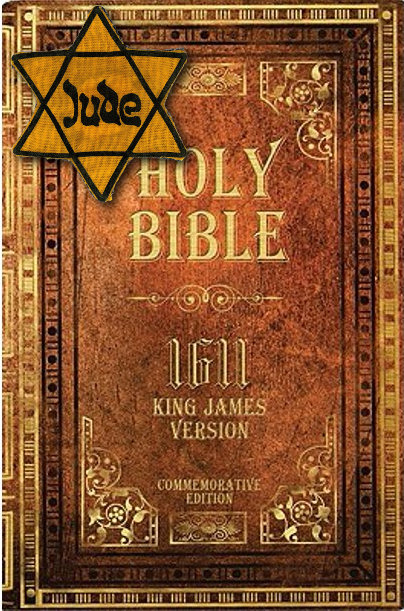

Joo in Bible?
Now that we all know that the word "Jew" never appears in the real Bible, what words are the (((KJV editors))) covering with that anachronism? We knew y'all were just dyin to find out, so here's the answer!
יְהוּדִיIn the OT, the word is simply ye-HOO-dee, yᵊhûḏî h3064 - of the tribe of Judah (Judahite) or any citizen of the territory of Judah (which would include Benjaminites), or from the two kingdoms period onward (i.e., the book of Ezra onward), sometimes also "Israelite"*. For example:
In 2 Kings 16:6 we find the first use of the term Judahite in the whole Bible. It tells us that the Judahites (of the Southern Kingdom) were driven from Elath by the Northern Kingdom.
Jeremiah 34:9. That every man should let his manservant, and every man his maidservant, being an Hebrew or an Hebrewess, go free; that none should serve himself of them, to wit, of a Judahite [Strong's h3064], his brother.
So here it seems that people primarily declared descendants of Eber were enslaved by Judahites. Hebrews is then a general term for Adamites (the older term) which later became Israelites in general (of the 12 tribes).
So there ya go. KJV OT "jew" should be rendered "Judahite", or sometimes from Ezra on, "Israelite" - very simple.
The NT joo
As with the OT, the NT has only one language (Greek) and one term which KJV smears with "jew", and that is Yoo-THEY-os, Ἰουδαῖος, Strong's G2453. It's true translation should be "judean". It is importantly dinstinct from Yehudi of the OT because King John Hyrcanus unified the kingdom of Judah, roughly today's Germans, with its mortal enemy, Idumea (the canaanites, edomites), and combining the two names into "Judea". You see how he did that? Judah + Idumea = Judea! Aha. So, when reading the NT it is important to know that when you see "Jew" or "iudeos" in Greek, you could be reading about canaanites/edomites (as John writes), Judahites (Jesus' own tribe, the largest Israelite tribe, modern Germans), OR both considered together.
The term in Strong's: Ἰουδαῖος Strong's G2453: Adjective, Judean (of Judea). From Ἰούδα (G2448) (in the sense of Ἰούδας (G2455) as a country). For example:
Romans 9:22,24: Moreover, if Yahweh wishes to display wrath, and to make known His power, with much patience having bore vessels of wrath furnished for destruction; 23 and so that He will make known the wealth of His honor upon vessels of mercy, which He previously prepared for honor; 24 whom also He has called, us not only from among the Judaeans, but also from out of the [Israelite] Nations? (CNT).
You might also run into this idea that John uses "Judeans", οἱ Ἰουδαῖοι, in a negative sense only, and that this plural is somehow a different word or sense altogether. [1]. I do not support this because Judean and Judeans are used as normal words, "residents of Judea", throughout other chapters of the NT. [1]. But in reality it's just John's own usage and style, and is not physically changing the definition of the root word.
* Gesenius' Hebrew-Chaldee Lexicon
Further reading
The (((protestants))) started this obfuscation with the term "Jew", using it in their bibles (started with the Luther bible), and planting the seeds of 1) "Judeo-Christianity" and 2) Infi-brotherwars. (Let's remember, too, that both the protestants and jesuits were canaanite inventions to spark infinite brother wars from 1524-1945). KBH article









